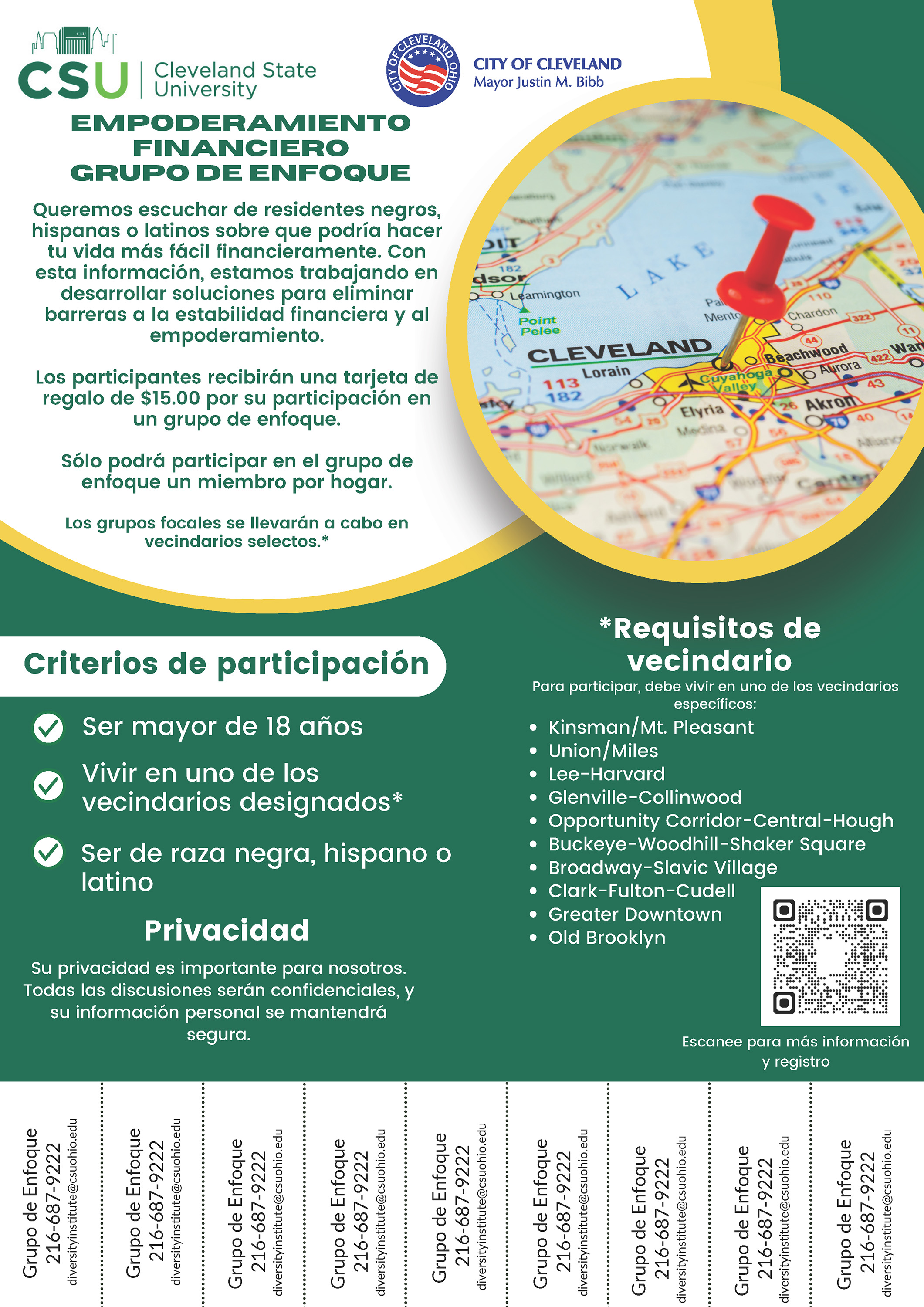People who are struggling financially often know what they need to help turn things around. The problem is they usually don’t have access to the resources to make this happen.
The City of Cleveland and Cleveland State University are working on an initiative aimed at drawing upon grassroots experiences to come up with solutions that could potentially improve the economic conditions of many moderate- and low-income residents.
The recently launched Financial Empowerment Focus Group is offering Black and Hispanic residents in designated Cleveland neighborhoods a platform for devising solutions to make their financial lives better. Ideas coming out of these focus group sessions will help in creating a city strategy aimed at developing what CSU is describing as “solutions to remove barriers to financial stability and empowerment.”
The Diversity Institute and the Center for Economic Development at CSU’s Maxine Goodman Levin School of Urban Affairs are overseeing the focus group and community outreach components of the financial empowerment study being conducted for the city. Ronnie A. Dunn, The Diversity Institute’s executive director, said seven focus group sessions have already been held.
“We’re seeking to find out through these focus groups how community members define what financial empowerment looks like to them,” said Dunn, also an associate professor of Urban Studies at the Maxine Goodman Levin School of Urban Affairs. “We don’t want to pre-determine or assume anything. We want to hear from residents and let them inform the process.”
He sees the process as a partnership between residents, the city and CSU.
“The residents have the expert knowledge,” he said. “We don’t come from the ivory tower, assuming we know what these communities need.”

Cleveland neighborhoods participating in Financial Empowerment Focus Group
These are the dozen neighborhoods/neighbor clusters in which focus groups are offered:
- Kinsman/Mt. Pleasant
- Union-Miles
- Lee-Harvard
- Glenville/Collinwood
- Opportunity Corridor/Central/Hough
- Buckeye-Woodhill/Shaker Square
- Broadway-Slavic Village
- Clark-Fulton/Cudell
- Fairfax
- St. Clair-Superior
- Greater Downtown
- Old Brooklyn
Residents of those areas who are over 18 can still join the focus group. (See contact information and fliers in Spanish and English below.) Participants will receive a $15 gift card for their involvement in one focus group.
“[We] are in particular need of residents within the Hispanic/Latino/Latinx community to participate in the focus groups,” Dunn wrote in an email to Signal Cleveland. “We’ve been having some challenges recruiting residents within that community.”
One of the ways this is being addressed is by providing translation as needed, he said.

The city received a grant to fund the Financial Empowerment Focus Group, study and other components. The grant came from the Cities for Financial Empowerment Fund’s CityStart initiative, which is supported by Bloomberg Philanthropies. The initiative guides local governments to work with residents in devising a financial empowerment blueprint “that is rooted in local insights and opportunities” and viewed through “a deliberate racial wealth equity lens.” The blueprint can address a number of economic issues, including the living wage, “quality” employment opportunities, debt and homeownership.
In addition to the focus group, Dunn said they’re conducting interviews with various neighborhood stakeholders. These include neighborhood-based organizations, nonprofit community development corporations and banking institutions.
For information about the focus group: (216) 687-9222 or diversityinstitute@csuohio.edu
Para obtener información sobre grupo de enfoque: (216) 687-9222; correo electrónico: diversityinstitute@csuohio.edu
Note: This story has been updated to reflect the current name of the Maxine Goodman Levin College School of Urban Affairs. The school’s previous name, the Maxine Goodman Levin College of Urban Affairs, was used in an earlier version of the this article.

